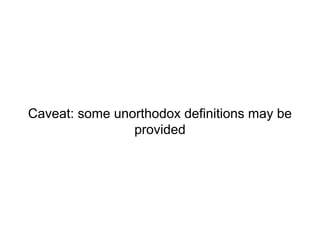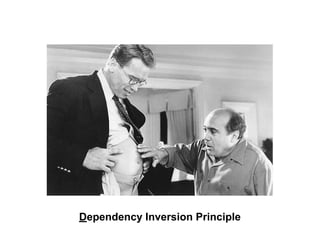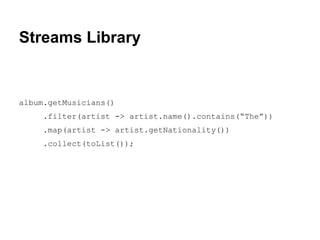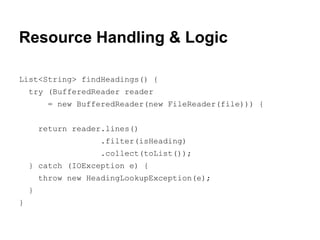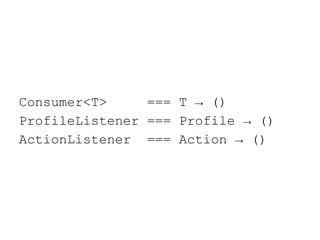Twins: Object Oriented Programming and Functional Programming
- 1. OOP and FP Richard Warburton
- 2. What on earth are you talking about? SOLID Principles Design Patterns Anthropology
- 4. In Quotes ... "OOP is to writing a program, what going through airport security is to flying" - Richard Mansfield "TDD replaces a type checker in Ruby in the same way that a strong drink replaces sorrows." - byorgey
- 5. In Quotes ... "Brain explosion is like a traditional pasttime in #haskell" "Some people claim everything is lisp. One time I was eating some spaghetti and someone came by and said: 'Hey, nice lisp dialect you're hacking in there'"
- 7. Caveat: some unorthodox definitions may be provided
- 8. What on earth are you talking about? SOLID Principles Design Patterns Anthropology
- 9. SOLID Principles ● Basic Object Oriented Programming Principles ● Make programs easier to maintain ● Guidelines to remove code smells
- 10. Single Responsibility Principle ● Each class/method should have single responsibility ● Responsibility means “reason to change” ● The responsibility should be encapsulated
- 11. int countPrimes(int upTo) { int tally = 0; for (int i = 1; i < upTo; i++) { boolean isPrime = true; for (int j = 2; j < i; j++) { if (i % j == 0) { isPrime = false; } } if (isPrime) { tally++; } } return tally; }
- 13. int countPrimes(int upTo) { int tally = 0; for (int i = 1; i < upTo; i++) { if (isPrime(i)) { tally++; } } return tally; } boolean isPrime(int number) { for (int i = 2; i < number; i++) { if (number % i == 0) { return false; } } return true; }
- 14. long countPrimes(int upTo) { return IntStream.range(1, upTo) .filter(this::isPrime) .count(); } boolean isPrime(int number) { return IntStream.range(2, number) .allMatch(x -> (number % x) != 0); }
- 15. Higher Order Functions ● Hard to write single responsibility code in Java before 8 ● Single responsibility requires ability to pass around behaviour ● Not just functions, Higher Order Functions
- 17. "software entities should be open for extension, but closed for modification" - Bertrand Meyer
- 18. Example: Graphing Metric Data
- 19. OCP as Polymorphism ● Graphing Metric Data ○ CpuUsage ○ ProcessDiskWrite ○ MachineIO ● GraphDisplay depends upon a TimeSeries rather than each individually ● No need to change GraphDisplay to add SwapTime
- 20. OCP as High Order Function // Example creation ThreadLocal<DateFormat> formatter = withInitial(() -> new SimpleDateFormat()); // Usage DateFormat formatter = formatter.get(); // Or ... AtomicInteger threadId = new AtomicInteger(); ThreadLocal<Integer> formatter = withInitial(() -> threadId.getAndIncrement());
- 21. OCP as Immutability ● Immutable Object cannot be modified after creation ● Safe to add additional behaviour ● New pure functions can’t break existing functionality because it can’t change state
- 22. Liskov Substitution Principle Let q(x) be a property provable about objects x of type T. Then q(y) should be true for objects y of type S where S is a subtype of T. * Excuse the informality
- 24. A subclass behaves like its parent. * This is a conscious simplification
- 25. 1. Where the parent worked the child should. 2. Where the parent caused an effect then the child should. 3. Where parent always stuck by something then the child should. 4. Don’t change things your parent didn’t.
- 26. Functional Perspective ● Inheritance isn’t key to FP ● Lesson: don’t inherit implementation and LSP isn’t an issue! ● Composite Reuse Principle already commonly accepted OOP principle
- 27. Interface Segregation Principle "The dependency of one class to another one should depend on the smallest possible interface" - Robert Martin
- 28. Factory Example interface Worker { public void goHome(); public void work(); } AssemblyLine requires instances of Worker: AssemblyWorker and Manager
- 29. The factories start using robots... … but a Robot doesn’t goHome()
- 30. Nominal Subtyping ● For Foo to extend Bar you need to see Foo extends Bar in your code. ● Relationship explicit between types based on the name of the type ● Common in Statically Typed, OO languages: Java, C++
- 31. class AssemblyWorker implements Worker class Manager implements Worker class Robot implements Worker
- 32. public void addWorker(Worker worker) { workers.add(worker); } public static AssemblyLine newLine() { AssemblyLine line = new AssemblyLine(); line.addWorker(new Manager()); line.addWorker(new AssemblyWorker()); line.addWorker(new Robot()); return line; }
- 33. Structural Subtyping ● Relationship implicit between types based on the shape/structure of the type ● If you call obj.getFoo() then obj needs a getFoo method ● Common in wacky language: Ocaml, Go, C++ Templates, Ruby (quack quack)
- 34. class StructuralWorker { def work(step:ProductionStep) { println( "I'm working on: " + step.getName) } }
- 35. def addWorker(worker: {def work(step:ProductionStep)}) { workers += worker } def newLine() = { val line = new AssemblyLine line.addWorker(new Manager()) line.addWorker(new StructuralWorker()) line.addWorker(new Robot()) line }
- 36. Hypothetically … def addWorker(worker) { workers += worker } def newLine() = { val line = new AssemblyLine line.addWorker(new Manager()) line.addWorker(new StructuralWorker()) line.addWorker(new Robot()) line }
- 37. Functional Interfaces ● An interface with a single abstract method ● By definition the minimal interface! ● Used as the inferred types for lambda expressions in Java 8
- 38. Thoughts on ISP ● Structural Subtyping removes the need for Interface Segregation Principle ● Functional Interfaces provide a nominal-structural bridge ● ISP != implementing 500 interfaces
- 40. Dependency Inversion Principle ● Abstractions should not depend on details, details should depend on abstractions ● Decouple glue code from business logic ● Inversion of Control/Dependency Injection is an implementation of DIP
- 41. Streams Library album.getMusicians() .filter(artist -> artist.name().contains(“The”)) .map(artist -> artist.getNationality()) .collect(toList());
- 42. Resource Handling & Logic List<String> findHeadings() { try (BufferedReader reader = new BufferedReader(new FileReader(file))) { return reader.lines() .filter(isHeading) .collect(toList()); } catch (IOException e) { throw new HeadingLookupException(e); } }
- 43. Business Logic private List<String> findHeadings() { return withLinesOf(file, lines -> lines.filter(isHeading) .collect(toList()), HeadingLookupException::new); }
- 44. Resource Handling <T> T withLinesOf(String file, Function<Stream<String>, T> handler, Function<IOException, RuntimeException> error) { try (BufferedReader reader = new BufferedReader(new FileReader(file))) { return handler.apply(reader.lines()); } catch (IOException e) { throw error.apply(e); } }
- 45. DIP Summary ● Higher Order Functions also provide Inversion of Control ● Abstraction != interface ● Functional resource handling, eg withFile in haskell
- 46. All the solid patterns have a functional equivalent
- 47. The same idea expressed in different ways
- 48. What on earth are you talking about? SOLID Principles Design Patterns Anthropology
- 49. Command Pattern • Receiver - performs the actual work. • Command - encapsulates all the information required to call the receiver. • Invoker - controls the sequencing and execution of one or more commands. • Client - creates concrete command instances
- 50. Macro: take something that’s long and make it short
- 51. public interface Editor { public void save(); public void open(); public void close(); }
- 52. public interface Action { public void perform(); }
- 53. public class Open implements Action { private final Editor editor; public Open(Editor editor) { this.editor = editor; } public void perform() { editor.open(); } }
- 54. public class Macro { private final List<Action> actions; … public void record(Action action) { actions.add(action); } public void run() { actions.forEach(Action::perform); } }
- 55. Macro macro = new Macro(); macro.record(new Open(editor)); macro.record(new Save(editor)); macro.record(new Close(editor)); macro.run();
- 56. The Command Object is a Function Macro macro = new Macro(); macro.record(() -> editor.open()); macro.record(() -> editor.save()); macro.record(() -> editor.close()); macro.run();
- 57. Observer Pattern
- 59. Concrete Example: Profiler public interface ProfileListener { public void accept(Profile profile); }
- 60. private final List<ProfileListener> listeners; public void addListener(ProfileListener listener) { listeners.add(listener); } private void accept(Profile profile) { for (ProfileListener listener : listeners) { listener.accept(profile) } }
- 61. Previously you needed to write this EVERY time.
- 62. Consumer<T> === T → () ProfileListener === Profile → () ActionListener === Action → ()
- 63. public class Listeners<T> implements Consumer<T> { private final List<Consumer<T>> consumers; public Listeners<T> add(Consumer<T> consumer) { consumers.add(consumer); return this; } @Override public void accept(T value) { consumers.forEach(consumer -> consumer.accept(value)); }
- 64. public ProfileListener provide( FlatViewModel flatModel, TreeViewModel treeModel) { Listeners<Profile> listener = new Listeners<Profile>() .of(flatModel::accept) .of(treeModel::accept); return listener::accept; }
- 65. Existing Design Patterns don’t need to be thrown away.
- 66. Existing Design Patterns can be improved.
- 67. What on earth are you talking about? SOLID Principles Design Patterns Anthropology
- 68. Popular programming language evolution follows Arnie’s career.
- 69. The 1980s were great!
- 70. Programming 80s style ● Strongly multiparadigm languages ○ Smalltalk 80 had lambda expressions ○ Common Lisp Object System ● Polyglot Programmers ● Fertile Language Research ● Implementation Progress - GC, JITs, etc.
- 71. The 1990s ruined everything
- 72. 90s and 2000s Market Convergence ● Huge Java popularity ramp ○ Javaone in 2001 - 28,000 attendees ○ Servlets, J2EE then Spring ● Virtual death of Smalltalk, LISP then Perl ● Object Oriented Dominance
- 73. Now everyone is friends
- 74. Increasingly Multiparadigm ● Established languages going multiparadigm ○ Java 8 - Generics + Lambdas ○ C++ - Templates, Lambdas ● Newer Languages are multi paradigm ○ F# ○ Ruby/Python/Groovy can be functional ○ New JVM languages: ■ Scala ■ Ceylon ■ Kotlin
- 75. http://java8training.com http://is.gd/javalambdas @richardwarburto http://insightfullogic.com






